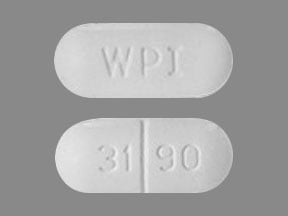
Metaxalone Coupons & Savings Card – Discount Prices from $49.58
Generic for: Skelaxin
Metaxalone is a medication prescribed to alleviate muscle spasms and pain, especially when these symptoms are associated with acute conditions. It is most effective when used in combination with rest, physical therapy, and other treatments. Although the exact mechanism of how metaxalone works is not fully understood, it is believed to ease muscle discomfort by relaxing the nervous system in the brain. Typically, this drug is taken orally three to four times a day. Common side effects include drowsiness and dizziness, so it's advisable to avoid alcohol as it may increase these effects. Always consult with your healthcare provider before starting metaxalone to ensure it's safe and appropriate for your condition.
Our coupons are free to use. Before paying, show the pharmacist your Metaxalone savings card to get your free discount. Use our filters below to edit the prescription box to match your needs. The Metaxalone prices will update based on your prescription needs. Above our Metaxalone coupons, you can change your location to see pharmacy prices and costs in other areas. We're here to help you buy Metaxalone at the lowest price with our prescription discount card.
My prescription
Edit
800MG, Metaxalone (90 Tablets)
Select pharmacy

CVS
$49.58
COUPON PRICE
Albertsons
$50.57
COUPON PRICE
Walgreens
$53.64
COUPON PRICE
Walmart
$58.16
COUPON PRICEMetaxalone savings card
Show this card to your pharmacist
CVS
$49.58
BIN
ID
PCN
GRP
019876
LHB5D0D650
CHIPPO
LHX
Powered by
Metaxalone is a medication prescribed to alleviate muscle spasms and pain, especially when these symptoms are associated with acute conditions. It is most effective when used in combination with rest, physical therapy, and other treatments. Although the exact mechanism of how metaxalone works is not fully understood, it is believed to ease muscle discomfort by relaxing the nervous system in the brain. Typically, this drug is taken orally three to four times a day. Common side effects include drowsiness and dizziness, so it's advisable to avoid alcohol as it may increase these effects. Always consult with your healthcare provider before starting metaxalone to ensure it's safe and appropriate for your condition.
Our coupons are free to use. Before paying, show the pharmacist your Metaxalone savings card to get your free discount. Use our filters below to edit the prescription box to match your needs. The Metaxalone prices will update based on your prescription needs. Above our Metaxalone coupons, you can change your location to see pharmacy prices and costs in other areas. We're here to help you buy Metaxalone at the lowest price with our prescription discount card.
More prescriptions for musculoskeletal conditions
coupons from$100.64Save 72%
coupons from$2171.46Save 15%
coupons from$15.72Save 78%
coupons from$10.81Save 74%
coupons from$46.32Save 92%
coupons from$4.36Save 83%
coupons from$1849.31Save 19%
coupons from$49.00Save 96%
More prescriptions for musculoskeletal conditions
Carisoprodol-aspirin-codeine Save 72%coupons from $100.64
Orphengesic Forte Save 15%coupons from $2171.46
Soma Save 78%coupons from $15.72
Fexmid Save 74%coupons from $10.81
Lorzone Save 92%coupons from $46.32
Valium Save 83%coupons from $4.36
Valtoco 5 Mg Dose Save 19%coupons from $1849.31
Amrix Save 96%coupons from $49.00
Metaxalone dosage forms
Use our Metaxalone 400MG coupon with prices from $98.70 for 30 Tablets. You can also use our Metaxalone 400MG coupon with prices from $299.15 for 100 Tablets. We have a Metaxalone 640MG coupon with prices from $3708.30 for 60 Tablets. You can use our Metaxalone 800MG coupon with prices from $49.58 for 90 Tablets.
Dosage Quantity Price from Per unit 400MG 30 Tablets $98.70 $3.29 400MG 100 Tablets $299.15 $2.99 640MG 60 Tablets $3708.30 $61.80 800MG 90 Tablets $49.58 $0.55 800MG 1 Tablet $3.05 $3.05 800MG 6 Tablets $5.78 $0.96 800MG 10 Tablets $7.96 $0.80 800MG 14 Tablets $10.15 $0.72 800MG 15 Tablets $10.69 $0.71 800MG 20 Tablets $13.42 $0.67
| Dosage | Quantity | Price from | Per unit |
|---|---|---|---|
| 400MG | 30 Tablets | $98.70 | $3.29 |
| 400MG | 100 Tablets | $299.15 | $2.99 |
| 640MG | 60 Tablets | $3708.30 | $61.80 |
| 800MG | 90 Tablets | $49.58 | $0.55 |
| 800MG | 1 Tablet | $3.05 | $3.05 |
| 800MG | 6 Tablets | $5.78 | $0.96 |
| 800MG | 10 Tablets | $7.96 | $0.80 |
| 800MG | 14 Tablets | $10.15 | $0.72 |
| 800MG | 15 Tablets | $10.69 | $0.71 |
| 800MG | 20 Tablets | $13.42 | $0.67 |
| 800MG | 21 Tablets | $13.97 | $0.67 |
| 800MG | 28 Tablets | $17.79 | $0.64 |
| 800MG | 30 Tablets | $18.89 | $0.63 |
| 800MG | 40 Tablets | $24.35 | $0.61 |
| 800MG | 50 Tablets | $28.80 | $0.58 |
| 800MG | 60 Tablets | $32.76 | $0.55 |
| 800MG | 100 Tablets | $52.17 | $0.52 |
| 800MG | 105 Tablets | $53.46 | $0.51 |
| 800MG | 120 Tablets | $57.34 | $0.48 |
| 800MG | 500 Tablets | $155.65 | $0.31 |
